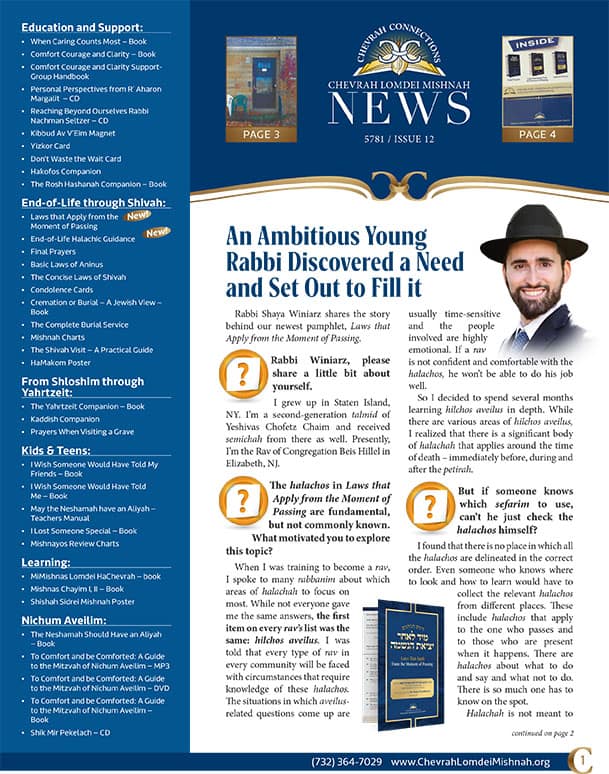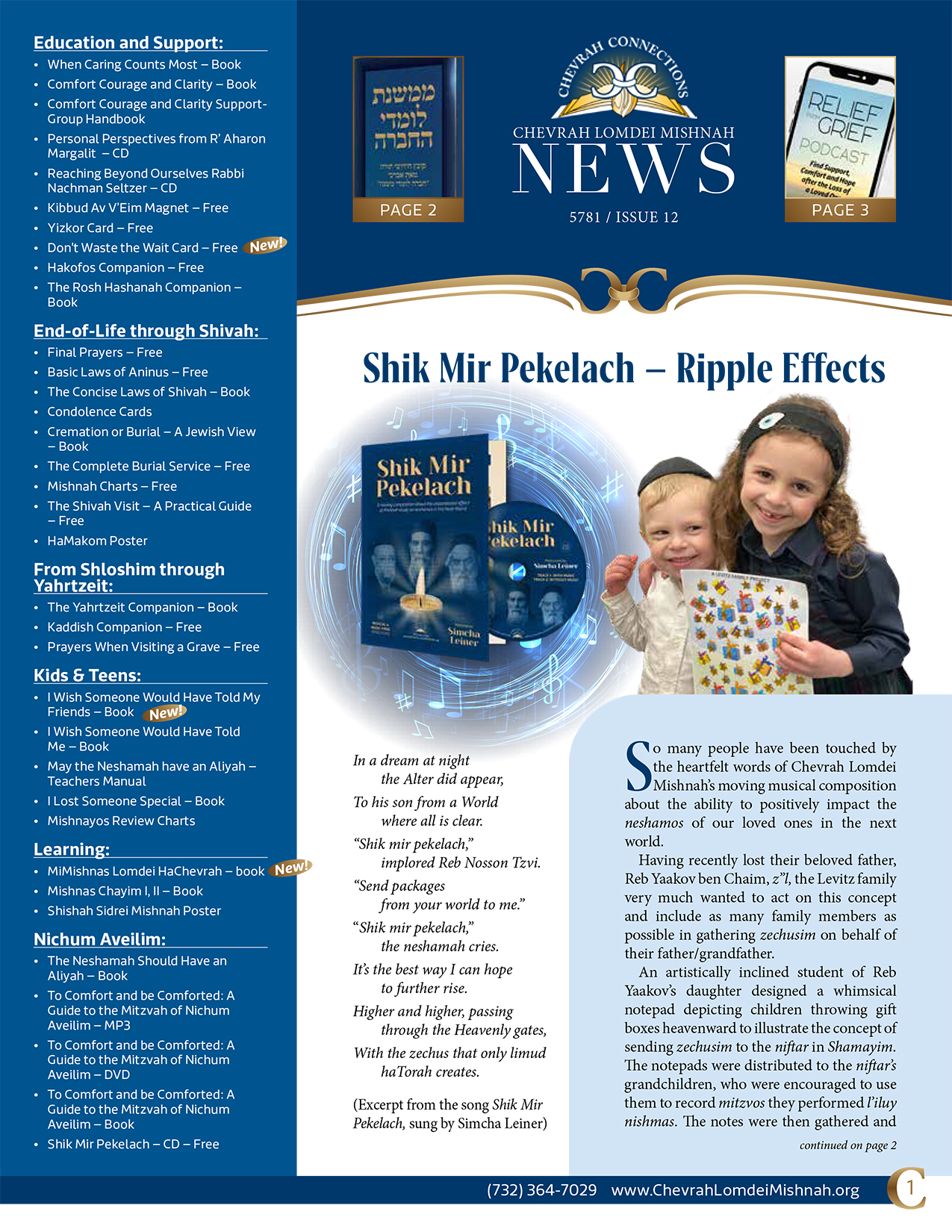Yated
By Rabbi Boruch Leff
I once read the following story in the Me’iri’s Chibur HaTeshuva (available in
any complete set of Me’iri in its own volume, page 652).
Alexander the Great was a famed warrior and as history tells us, a highly successful one. Still, his mother worried that since her son was always going to war, one day his luck would dry up and he would be killed. She was afraid that she would not be able to deal with the tragedy.
Alexander handed her two envelopes and told her that in the event of his death she should open the envelope that says #1 and read what is inside. Years later, the fateful day came and Alexander died in battle. His mother opened the envelope and found a note written by Alexander saying that while he understood her grief, he would like her to experience her bereavement in the following way. He asked her to make a grand feast, publicize it all over the city, and invite only those people who have never experienced pain, suffering, or grief in their lives. The note concluded to instruct that the second envelope should be opened after the feast.
His mother followed the directions exactly, scheduled the location and date of the feast and attended. And waited for guests. And waited. No one came.
She came home and opened the second letter. Alexander wrote to her, “You see that no one came to the feast. That is because there is no one who has ever lived who has never experienced pain, suffering, and grief. This is the way of the world. Just knowing this ultimately acts as a comfort.”
The Me’iri utilizes this story as a nichum to all aveilim. All people who have ever lived experience the pain of losing a loved one, and if they haven’t, it is only because a greater tragedy occurred—they died before their parents died. This is the way Hashem made the world, ever since Adom and Chava sinned by eating from the aitz ha’da’as.
This could be part of the meaning why we comfort mourners by saying, “HaMakom yinachem eschem b’soch sh’ar aveilei Tzion V’Yerushalayim.” We are indicating that the mourner is not the sole person ever to suffer grief. We all suffer in similar ways as the particular mourner to whom we are directing our blessing of HaMakom. All of us are mourners, for the Temple, and for other personal tragedies.
The writer Sarah Shapiro once conveyed this message in the following way:
“When my father died in 1990, one condolence card especially comforted me, and I’ve saved it all these years. The picture is a black-and-white photograph of the Brooklyn Bridge, in mist and fog, vanishing into the distance. The note inside reads as follows: ‘I was shocked to learn of your father’s departure from this life. He has crossed the bridge we must all cross one day.’
That’s all, a few words, yet they were like a rope of rescue, a line of light lowered into the sea in which I was thrashing wildly around, struggling in the wake of our cataclysmic disaster. I’d been aware, of course, that human lives come to an end, but hadn’t known it could happen to one of my parents, and didn’t know that I didn’t know. My father’s unanticipated “departure,” kept hitting me again and again as if for the first time, like some horrible aberration, an impossible reversal of the natural order, a horrific violation of the way things had to be. Without him, the world wasn’t the world.
The card informed me of something: we die. Death is universal and unavoidable. Losing someone important has happened one way or another to anyone who’s ever lived.”
Yes, death is universal but it remains so very hard to deal with. How can we continue after losing a loved one?
A very recently published book helps ease the pain.
The Neshamah Should Have an Aliyah, by Rabbi Tzvi Hebel (Judaica Press) is a wonderful, encyclopedic, and scholarly work that fills a very important need.
As Rabbi Hebel beautifully writes in his introduction: “The awareness that every Jew has tremendous ability and opportunity to elevate the souls of his departed loved ones can be a source of encouragement and comfort. When sons and daughters, grandchildren, parents, nieces, nephews and friends realize that it is within their power to continue to help their departed loved ones, their own lives can take on new meaning. It can serve as an infusion of strength, helping them carry on as they come to appreciate that the bond with their loved ones is not severed, but continues to grow stronger on a daily basis.”
“As believing Jews, we know that a person’s life does not end with his demise, but that the neshamah, after leaving this physical world, continues its existence in the World to Come.
But the departed can no longer grow and spiritually elevate themselves. Whatever merits the neshamah has accrued during its earthly stay will accompany it for the rest of time. However, those left behind, who mourn the departure of this soul, can provide help. Whereas the neshamah’s own ability to improve its position has ended, surviving relatives and friends can generate abundant merit on the soul’s behalf. As individuals, as families and as communities,
we have before us a remarkable opportunity to engage in the highest form of kindness — chessed shel emes, true kindness.”
The sefer delineates a comprehensive description of all that can be done to create merits for the deceased, all based upon seforim and poskim. Learning mishnayos, tzedakah, chesed, adopting mitzvos, special prayers, kaddish, are explained in depth. Very practical tips and suggestions are offered. An extensive section deals with the spiritual mechanics and philosophy of how and why performing mitzvos helps the niftar when he/she is not personally doing it.
After personally reading this phenomenal work, I feel compelled to share it with others. There are truly no words to describe the comfort and inspiration I received in reading this work, especially after recently losing my mother, aleha hashalom, hareini kaparas mishkavah, two months ago.
The sefer has phenomemal haskamos from Rav Reuvein Feinstein, shlita, Rav Yeruchem Olshin, shlita, and Rav Noach Orlowek, shlita. As an added bonus, it comes with a complementary DVD with shiurim from Rav Yissachar Frand, shlita, and Rav Paysach Krohn, shlita, talking about the sefer and the subject of creating merits for a niftar.
If one wants to grow with passion within this realm of avodas Hashem, The Neshamah Should Have an Aliyah, really is a must read.
For more information and various sponsorship opportunities, contact Chevrah Lomdei Mishnah at 732-364-7029 or at ChevrahLomdeiMishnah.org.
– January 2010













